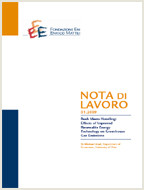Oil Price Dynamics, Macro-Finance Interactions and the Role of Financial Speculation

09.02.2012
Claudio Morana
C22, E32, G12
Oil Price, Financial speculation, Macro-finance Interface, International Business Cycle, Factor Vector Autoregressive Models
Energy: Resources and Markets
Giuseppe Sammarco
What is the role of financial speculation in determining the real oil price? We find that while macroeconomic shocks have been the major upward driver of the real oil price since the mid 1980s, also financial shocks have sizably contributed since the early 2000s, and at a much larger extent since the mid 2000s: over the period 2004:1 through 2010:3, the real oil price increased 65%; of the latter, 33% is related to fundamental financial shocks, 11% to non fundamental financial shocks, with macroeconomic and oil market supply side shocks contributing with a 5% and 3% increase, respectively. Yet, it would be inaccurate describing the third oil price shock as a purely financial episode: macroeconomic shocks largely accounted for the 65% real oil price run up over the 2007(2)-2008 (2) period, and similarly for the -67% and -31% contractions in 2008(4) and 2009(1); only over the 2009(2) through 2009(4) period macroeconomic and financial shocks equally contributed to the 54% real oil price increase. Hence, while we find support to the demand side view of real oil price determination, we also find a much larger role for financial shocks than previously noted in the literature.
Suggested citation: Claudio Morana, Oil price dynamics, macro-finance interactions and the role of financial speculation, Journal of Banking & Finance, Volume 37, Issue 1, January 2013, Pages 206-226, ISSN 0378-4266, http://dx.doi.org/10.1016/j.jbankfin.2012.08.027.
